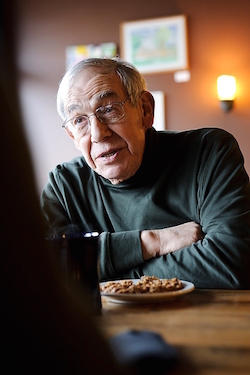UW-Madison professor and Nixon historian Stanley Kutler dies
Stanley Kutler, the University of Wisconsin–Madison historian who fought for the release of hours of tape recordings related to the Watergate scandal, died Tuesday at the age of 80 after a brief stay in hospice.
President Richard Nixon taped thousands of hours of phone calls and private meetings in his executive offices between February 1971 and July 1973. While Nixon fought to keep those secretly recorded conversations private, Kutler sued and won, forcing the release of the tapes through a deal with Nixon’s estate and the National Archives. On Aug. 21, 2013, the final chronological installment containing 340 hours of those conversations was posted online by the National Archives and Records Administration.
In a 2011 interview, Kutler, an emeritus professor of law and history, said the records gave people a chance to hear Nixon minus his lawyers, handlers and “spinmeisters.”

Kutler was professor emeritus of law and history at UW–Madison.
“This is a chance to hear Richard Nixon unplugged, if you will,” Kutler said.
It wasn’t the first time Kutler fought for access to Nixon records. In 1996, he won a lengthy legal battle for the release of recordings that verified Nixon’s knowledge and participation in the Watergate cover-up.
Kutler authored a 1997 book, “Abuse of Power: The New Nixon Tapes,” about the records released in 1996. He is also the author of “The Wars of Watergate: The Last Crisis of Richard Nixon,” considered by many to be the definitive book on the scandal. He collaborated with actor Harry Shearer to write the play “I, Nixon” and again for the television series “Nixon’s the One.”
On Tuesday, Shearer tweeted, “And RIP my great writing partner on ‘Nixon’s the One,’ Stanley Kutler. He wrote the book. Two of them. Amazon him …”
Kutler told the Milwaukee Journal Sentinel he harbored no hatred of Nixon.
“I’m alternately amused and appalled by him,” he once said.
On the 35th anniversary of Nixon’s resignation, Kutler wrote, “Today, we speak of presidential abuses of power as being ‘worse than Watergate’ in their contempt for lawful processes and the rule of law. The ‘lessons’ and meaning of Richard Nixon remain exquisitely relevant.”
While known for his work regarding Nixon, Kutler also was considered one of the country’s leading American legal and constitutional historians, concentrating on the 20th century.
“Today, we speak of presidential abuses of power as being ‘worse than Watergate’ in their contempt for lawful processes and the rule of law. The ‘lessons’ and meaning of Richard Nixon remain exquisitely relevant.”
Stanley Kutler
His son Andy told the Wisconsin State Journal that Kutler was one of those professors a student never forgets.
“He would get mail from former students saying that a senior seminar back in 1974 inspired them to go do this or that,” Andy Kutler said. “We couldn’t go to a restaurant or anywhere without someone stopping him to comment what an influence or inspiration he had been.”
For Kutler, it wasn’t just about Nixon. It was about access. In a 2011 interview, Kutler said the records likely would not have been released if Nixon were still alive. The historical importance of the investigation, and the need to thoroughly document and understand that dark chapter in our country’s history, trumps privacy arguments, he said.
“Historians are dependent on source material. That was a source out there that was being kept from us,” Kutler said. “This is all about establishing further precedent, to make things more transparent.”
Kutler was a native of Shaker Heights, Ohio, and a graduate of Bowling Green University, where he met his wife. She survives him, as do sons Andy and David, and daughter Susan. Another son, Jeff, is deceased. A service at Temple Beth El in Madison is set for 1:30 p.m. Sunday.
Tags: history, law, obituaries





